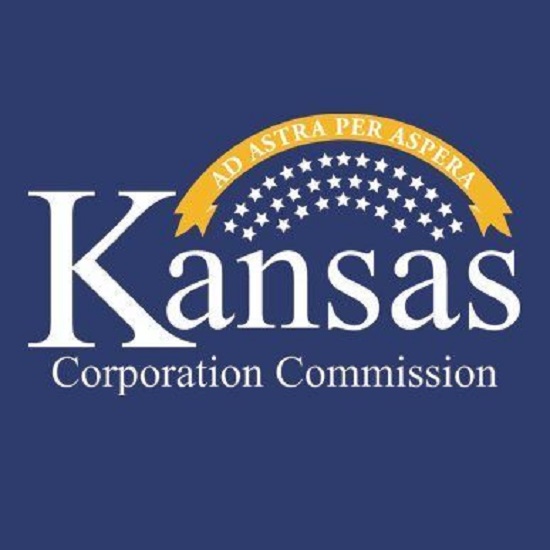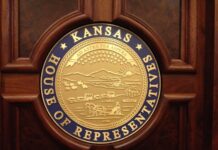The Kansas House on Thursday decisively defeated a bill that would have exempted the panel that oversees utility regulation from the state’s open meetings law to discuss docketed cases.
The bill, which was defeated 38-82, would have allowed a majority of the three-member Kansas Corporation Commission to talk to each other about docketed cases among themselves without calling a public meeting and violating the state’s open meeting law.
Officials say there has been some ambiguity over whether the open meetings law applies to the Kansas Corporation Commission and whether it gives the regulatory staff an extraordinary amount of power.
The bill would give commissioners the ability to deliberate on a case individually after a hearing, similar to a panel of judges on the state appeals court.
It also would prohibit parties involved in docketed cases before the KCC from having outside communications with commissioners.

“This bill would aid us in making our processes more efficient,” KCC Chair Andrew French said during a recent meeting of the KCC.
“It would be helpful to have that ability, just like a court does, (that) when we hear all the evidence to be able to deliberate on that evidence directly,” French said.
“The matters we hear are so technical and complex,” French said.
“It would be good to have sort of a private vetting of those issues, be able to explore them openly and candidly between ourselves,” he said.
French said the KCC’s proceedings are already judicial in nature. The fact that the KCC is subject to judicial review means it can’t act arbitrarily and contrary to evidence.
“I think it’s probably universally accepted that the courts benefit from that ability to privately and candidly deliberate on the matters before them,” he said.
“I think that same rationale would apply to our docketed matters,” he said.
Republican state Rep. Carrie Barth of Baldwin City opposed the bill, saying there wasn’t enough transparency in the world of utility regulation that affects every Kansan.
“Open meetings are meant to be one thing. Open,” Barth told the House on Wednesday when the bill was debated on the floor.
“Dockets are the only way that new things come in through the KCC,” Barth said.
“So why are we going to give them an excuse to have meetings behind closed doors where they can say whatever they want to say without the people it would affect knowing what is going on and what’s being said?” Barth said.
Republican state Rep. Kenny Titus of Manhattan said he understood why the bill was proposed but still opposed the legislation.
“While I appreciate the goal of facilitating communications, I do believe when we’re dealing with regulated monopolies, it’s a different situation,” Titus said.
Titus noted that the agency agreed it didn’t need the legislation to do a good job.
“I fail to see the reason we need to address this by removing the Open Meetings Act exemption,” he said.
Democratic state Rep. John Carmichael argued for the exemption, saying the commission should be able to meet in quasi-judicial proceedings to discuss docketed cases.
He said the bill would not cover KCC meetings where the agency would discuss operations such as budgeting and carrying out other administrative functions.
“When the KCC puts on its judges’ hat, then they need the ability to confer just like a panel of three judges of the court of appeals,” Carmichael said.
Democratic state Rep. Cindy Neighbor of Shawnee said the bill would allow the commissioners to confer on major issues that affect all Kansans.
“We need to make those decisions right with good information and communication between partners,” Neighbor said.
French said he didn’t think the bill would undercut any of the public policy justifications for the state’s open meetings law.
He noted that the agency is subject to the Kansas Administrative Procedures Act and the Kansas Judicial Review Act.
He said the KCC’s proceedings are already judicial in nature. The fact that the KCC is subject to judicial review means it can’t act arbitrarily and contrary to evidence.
“I think it’s probably universally accepted that the courts benefit from that ability to privately and candidly deliberate on the matters before them,” he said.
“I think that same rationale would apply to our docketed matters,” he said.
French stressed that the bill doesn’t provide a full exemption from the open meetings act, but only for courtlike proceedings that the commission undertakes.
The Kansas Press Association urged lawmakers to reject the proposed exemption to the open meetings law.
The group said the exemption should be granted only if the bill’s supporters “can accomplish the very tall task of articulating a substantial government interest that outweighs the public’s right be informed.
“KPA struggles to identify what that interest could be. Even rural water districts and other public bodies across the state with few members are and have been subject to KOMA since its inception,” the group said.
Evergy testified as “neutral” on the bill, but saw benefits.
“This increased dialogue would likely aid commissioners as they work through issues before
preparing final orders,” said Chuck Caisley, Evergy’s chief customer officer.
“That said, years back, the commissioners utilized their open meeting agenda sessions to have open, transparent discussion of their positions before finalizing orders in docketed
proceedings,” he said in written testimony.
“These discussions were held under existing statutes and could be a workable forum for the
commission to improve transparent dialogue of their individual positions” in the event the bill failed to pass.















